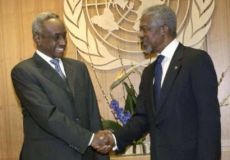Sudan insists on its courts for Darfur crimes, but others want international trials
By EDITH M. LEDERER, Associated Press Writer
UNITED NATIONS, Feb 9, 2005 (AP) — Sudan insists its courts should prosecute alleged perpetrators of human rights abuses in the Darfur region, but the United States and other Security Council members want international trials — although they disagree where.

|
|
UN Secretary General Kofi Annan (R), shakes hands with Ali Osman Mohammed Taha (L), Vice President of Sudan, in New York February 8, 2005. (Reuters). |
Sudan’s first vice president, Ali Osman Mohammed Taha, told the U.N. Security Council on Tuesday that his government believes it has the will, commitment and legal expertise to prosecute those accused of atrocities.
“We are here to persuade the Security Council to see the wisdom and the rationale in bringing those accused before trial in Sudan,” Taha told reporters afterwards. “And we strongly believe that there are no grounds to taking suspects outside the country.”
Taha’s appeal came as the 15 council members wrestled over the prosecution of Sudanese officials and militiamen accused of crimes against humanity in Darfur, where a two-year conflict has forced more than 2 million people to flee their homes and left more than 70,000 dead, mainly from disease and hunger.
The Darfur conflict began two years ago after two non-Arab rebel groups took up arms against the Arab-dominated government in a bid to win more political and economic rights for the region’s African tribes people.
Sudan’s government is accused of responding to the rebel counterinsurgency by backing the Janjaweed — camel and horse-riding Arab militiamen — in a campaign of wide-scale abuses against Sudanese of African origin. The government, based in the capital, Khartoum, denies backing the Janjaweed.
Last week, a U.N.-appointed commission found evidence of crimes against humanity and war crimes in Darfur, but stopped short of labeling the crisis genocide.
It recommended that cases be presented to the International Criminal Court and gave Secretary-General Kofi Annan a sealed list of 51 alleged perpetrators, including very high-level Sudanese officials, rebels and Arab Janjaweed militiamen.
The United States vehemently opposes the world’s first permanent war crimes tribunal, and is pressing instead for alleged perpetrators to be tried by a new tribunal based in Arusha, Tanzania. The U.S. ambassador-at-large for war crimes, Pierre-Richard Prosper, met with the 15 council members Tuesday afternoon to explain the U.S. proposal, council diplomats said.
Sudan’s Taha argued that holding trials outside Sudan “will push things to degenerate rather than help people to reconcile or maintain peace.”
But U.S. deputy ambassador Stuart Holliday said the United States and other council members believe “that there needs to be strong international involvement in the accountability process.”
Asked whether there was any support for the U.S. proposal for a new Arusha tribunal, Algeria’s U.N. Ambassador Abdallah Baali, said, “it’s going to be incredibly difficult.”
He said the issue of accountability is very controversial and could complicate deployment of a 10,130-strong U.N. peacekeeping mission that the Security Council is expected to approve to enforce last month’s peace deal that ended the country’s 21-year civil war between the north and the south. That conflict is separate from the one in Darfur.
Council members have been informally discussing elements for a new resolution on the way forward in Sudan which is expected to include Annan’s request for a peacekeeping mission. But members are divided on how to punish those responsible for crimes in Darfur and on possible sanctions, including an arms or oil embargo, an asset freeze and travel ban.
Taha and southern rebel leader John Garang, who negotiated the peace deal, called for an immediate end to the fighting and a resumption of peace talks with the goal of reaching an agreement in 2005 to end the Darfur conflict.
Garang said last month’s agreement ending the north-south conflict could serve as a basis to settle the conflict in Darfur. He said the peace effort should be backed by a 30,000-strong force to stabilize the vast western region, with 10,000 troops provided by the government, his rebel Sudan People’s Liberation Army, and the African Union.
Garang, who spent 10 years negotiating an end to the civil war and will shortly become a vice president in a new Sudanese government, told the Security Council the north-south agreement should also be used as a model to end a long low-intensity conflict in eastern Sudan which recently flared up.
Garang said he was “encouraged” that the Jan. 9 peace agreement could be successfully applied in both Darfur and eastern Sudan as a result of talks he held with government leaders in the region and leaders of all armed groups involved in both conflicts before flying to New York.
“I’m optimistic that the comprehensive peace agreement has now considerably improved prospects for a resolution of the Darfur conflict as well as that of eastern Sudan,” he told an open council meeting.
As a first step, he called on the parties “to accept in principle and preferably even commit themselves before the United Nations Security Council to accept the comprehensive peace agreement as the basis for solving the conflicts in Darfur and eastern Sudan.”
Garang also suggested that the parties commit themselves to a deadline to reach agreement — just as the Sudanese government and his rebel Sudan People’s Liberation Movement did when the Security Council held a rare meeting in Nairobi in November.
